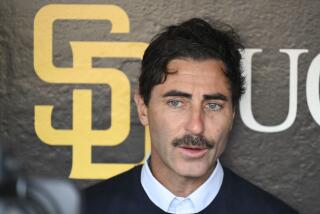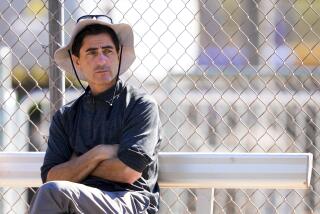Royals Just About Ready to Get on Their Sell Phones
- Share via
Allard Baird, the Kansas City Royals’ general manager, hasn’t ignited his proclaimed fire sale yet, but he has the match in hand and is watching closely.
“We’re basically playing a one-game series every night,” Baird said by phone, having informed his team about 10 days ago that it had one week to turn a disappointing season around or he would start shopping players and putting his focus on 2005.
The Royals, a surprise team last year when they challenged for the American League Central title before finishing third at 83-79 under manager-of-the-year Tony Pena in his first full season at the helm, went into Saturday’s game against the Boston Red Sox having improved to 7-4 since Baird issued his ultimatum, picking up two games in the standings while still last at 20-32.
“What I basically told our club was that if we don’t get back into it now, then we’re going to look at 2005 and we’re going to move players, potential free agents, obviously, and guys we don’t think we can sign,” Baird said. “I basically told our guys, ‘Look, now’s the time, we’re not going to wait for the [July 31] trade deadline or anything to make that determination.’ I told them, ‘We’re behind the eight-ball and we don’t want to fall off the table completely.’ ”
Baird said his thinking was simple: If his team was so far behind in early June that it didn’t have a realistic chance of getting back in the race, it would be prudent to flip the calendar.
“The focus in Kansas City has to be on the continued development of our young players and the addition of parts around them,” he said.
“By moving players now rather than waiting for the trade deadline, the player we trade has more value to the team that acquires him because that team gets the player for one or two months more than it would have if we had waited for the deadline. That means we should get more in return.”
Baird has one big-time player on the block in Carlos Beltran, an attractive ancillary piece in Joe Randa, and several less-formidable possibilities, including the oft-injured Juan Gonzalez.
Although eligible for free agency when the season ends and certain to test the market under the direction of agent Scott Boras, Beltran should generate his own firestorm of interest -- whether it’s now or in July. Among the potential suitors in addition to the omnipresent New York Yankees and Red Sox: the Dodgers, San Diego Padres, Chicago White Sox, Oakland Athletics, Florida Marlins and, perhaps, San Francisco Giants.
Has his phone stopped ringing since he revealed his ultimatum?
“I think I’ve called people more than they’ve called me, just to let them know where we’re at,” Baird said, “and basically what I’ve told them was, ‘We’re in a situation where we haven’t played good baseball and that’s a bigger concern than the talent level on the club, and I’ve given the club a week or so and if we don’t get this thing moving forward, then we’re going to have some players available.’ I’ve made people aware of that, not only the fans and my own players, so I think a lot of teams know where we sit.”
*
Officials of the players’ union and Major League Baseball remain optimistic that talks between the sides will produce a tougher steroid-testing program that could still be implemented this year.
Although this was to be the first year of mandatory testing with penalties for positive results and a third of the season has been played, no major league player has been tested yet, sources familiar with the program said.
Because players can be tested only once between March and September, not including a follow-up test five to seven days later, the committee charged with administering the program is hanging the solo test over the players’ heads rather than testing in March or early season and effectively giving players permission to use a banned substance for the rest of the year.
The decision to test later than earlier, the sources said, also may be an admission that MLB and the union are closing in on a tougher program.
Asked about that, Commissioner Bud Selig said the discussions were ongoing and termed them “productive and intense.”
Does he expect an agreement?
“Let’s just say I’m hopeful,” he said.
This year?
“Yes.”
*
It had been speculated for some time that the Padres would choose Long Beach State pitcher Jered Weaver, Jeff’s brother, with the first overall pick in Monday’s amateur draft, but the opinion now is that the Padres will switch to Florida State shortstop Stephen Drew as the No. 1 with Weaver and Rice pitcher Jeff Niemann as possibilities.
Given the solid emergence of their rookie shortstop, Khalil Greene, some in the industry are surprised that the Padres would opt for another young shortstop, although Drew (whose brothers Tim and J.D. were also first-round selections) can also play center field.
However, the 2004 draft crop is perceived to be much deeper in pitchers than position players, and General Manager Kevin Towers believes there will still be pitching options later in the draft, as there were in 1999, when the Padres selected Jake Peavy in the 15th round, and 1998, when they chose Brian Lawrence in the 17th round.
“It is much harder to find good hitters in the draft than good pitchers,” Towers said. “There is also less of an injury risk with a position player.”
More to Read
Go beyond the scoreboard
Get the latest on L.A.'s teams in the daily Sports Report newsletter.
You may occasionally receive promotional content from the Los Angeles Times.










